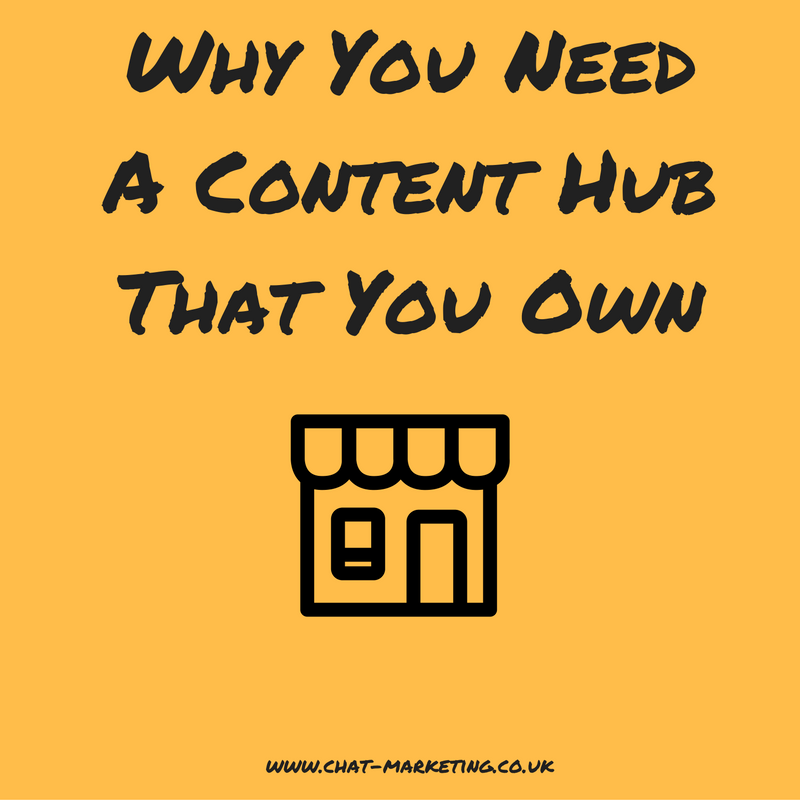Why You Need a Content Hub That You Own
Most Popular
Our Testimonials
- "When it comes to social media Alan is extremely knowledgeable, easy to get on with and it was a pleasure to work with him. He is one of life’s good guys. Nothing is too much trouble for him. He listens to your social media challenges and gives you strategies and tools that work."Maureen Sharphouse
Coach, Speaker, Mentor - “Chat Marketing have helped steer us through the bewildering array of Social Networking opportunities and have shown us how to get the most out of this medium from a business point of view. Alan is easy to work with, a good listener who delivers excellent results.”David Adams
Adams Law - “I've just attended Chat Marketing's "Twitter4Business" workshop this morning. What an excellent and informative event. I would highly recommend Alan and Chat Marketing to any business looking to get started in the bewildering world of social media. Many thanks Alan.”Andy Perkins
F8 Venues

Are you spinning your wheels on social media but not getting the business results that you expected?
One of the reasons for that might be that you are sending traffic to everyone else’s content hub and not your own.
In this article, I’ll explore why you should invest in your own content hub as a home for your content assets, and what it can do for your business.
But first…
What’s A Content Hub?
A content hub is simply a place on the internet (that you preferably own) where you store and distribute content around a particular topic. It is a base for all your content! An example of a good content hub would be a blog or a podcast, but it could refer to any property on the internet that you can control.
Content hubs can be used to store a mix of content formats including, text, audio and video, as well as downloadable documents and other resources. Your website could be your ‘content hub’, especially if integrated with a blog.
Why Do You Need One?
Sharing other people’s content via social media is a great idea. Not only are you providing value to your fans by sharing good quality content, but you could also potentially establish relationships with content creators. That being said, if you are constantly sending traffic to other people’s blog articles rather than your own, then you are missing out on a big opportunity.
One of the benefits of social media is that it can be used to send traffic to content on your hub, which has a number of other associated benefits for your business including:
- Authority
- SEO
- Control
- Analytics
- Segmentation/Retargeting
- Marketing
Authority
By consistently writing hight quality articles you will be seen as an industry expert and over time, develop a reputation as being a thought-leader. By storing your content in one place, your articles will be better organised and so will be more easily found and consumed by your readers. An added advantage of housing your content other than on social media is because it is easier to link to other resources of interest within your content hub.
This will mean that readers will spend longer on your site, which brings me nicely to the second point!
SEO
Google loves good quality content and by housing all your content in the one place, you build up a resource of content that solves people’s problems. Visitors will spend longer on your site, which is a signal to Google that your website is a high quality resource. Creating regular content on your site, is another signal to Google that the site is very active. These are all activities that will help your site rank higher in search engine results.
Obviously if more people are finding your site through search, the more likely you are to get business from it.
Control
You don’t control Facebook, or any other social network for that matter, but you do control your content hub if you own it. You have the power to control what your site looks like and the quality of the visitor experience, which you can optimise for your business rather than being at the mercy of someone else’s agenda.
Analytics
The main social media platforms provide admins with some really useful data about how their page is performing, but these are insignificant in comparison to the user data that you could get by installing Google Analytics on your website. Having access to this wealth of information can help you improve your marketing performance.
Segmentation/Retargeting
Similar to the above point, having content in one place allows you to segment your audience by using Facebook’s ad retargeting pixel. Once the pixel has been installed on your site, you could target ads at people you know are interested in a certain topic, based on the articles that they have read. That means that the copy that you use in your ad can be tailored to the specific need that is expressed by them reading your content.
Click here to learn how to install the tracking pixel
Marketing
And lastly, if people are on your site to read your content you also have the ability to attract them to other parts of your site, or generate leads by having people opt in to get a lead magnet.
Conclusion
Hopefully by now you can see the opportunities that you could be missing out on if you are not sending people to your Content Hub. Once you have your hub you can use the various social media platforms to send traffic to your resources.
Let me know in the comments below if you are using a content hub and what specifically you are using to house your content e.g. blog, podcast etc.

